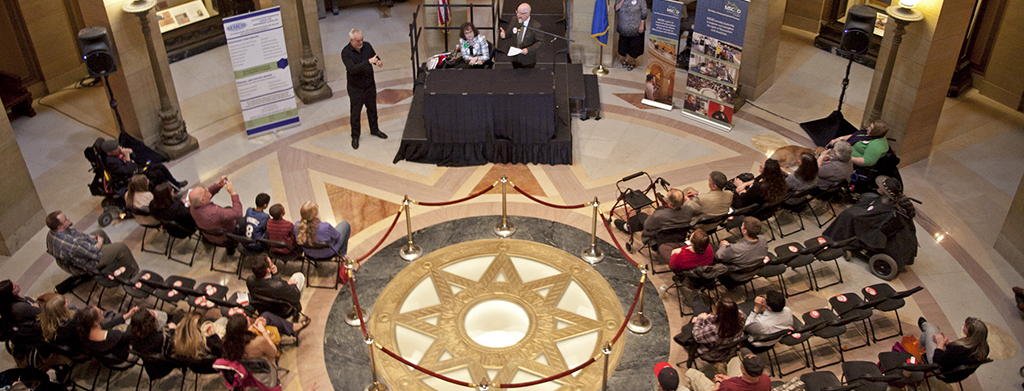
The Minnesota Council on Disability policy staff continued to meet with legislators on committees related to MCD’s 2019 public policy agenda (PDF).
One policy item that continues to gain traction is the Transportation Network Company (TNC) legislation. A transportation network company, sometimes known as a mobility service provider or ride-hailing service, is a company that matches passengers with drivers via websites and mobile apps. Two popular TNC companies operating in our state are Uber and Lyft.
These companies are being discussed to identify ways to standardize operations in all communities of Minnesota. The MN Council on Disability was part of a larger workgroup convened by the Minnesota League of Cities to identify stakeholder needs and concerns. In engaging with our disability community, we learned that many Minnesotans with disabilities do not consistently receive equitable services on TNC platforms.
Minnesotans with disabilities who use a service dog expressed that TNC drivers would frequently deny service to them, despite the fact that federal law prohibits this practice. Reporting such discrimination was challenging and consequences for drivers were not satisfactory. The Council believes that legislation should protect these consumers and guarantee their rights to use services. Blind, low-vision, Deaf and consumers with autism expressed concerns regarding the digital accessibility of TNC platforms and wanted to ensure that policy ensures digital access.
Minnesotans who use wheelchairs and other mobility devices are consistently challenged to find equitable, on-demand transportation on these platforms to meet their needs. There are simply not enough Wheelchair Accessible Vehicles (WAV) operating on our streets to meet the demand. The reasons why are not hard to find. These vehicles are expensive to purchase–a new WAV can cost from $60-80,000. Maintenance costs related to the equipment and fuel are also quite expensive. The Council recognizes that the TNC business model is not cost-effective for providing WAV services and believes that the State has a role in facilitating financial incentives for entrepreneurs and companies that provide these needed services.
As ruled in federal court, TNC companies are a public service company and must adhere to the Americans with Disabilities Act by providing equitable services to all. A full report on this issue (PDF) [pages 278-292] can be found with the National Council on Disability. The Council’s full policy position on this issue can be found at: Accessible Policy Solutions for Transportation Network Companies in Minnesota.
Follow the Council on Disability on our website and social media to follow the status of this policy and other legislation that impacts Minnesotans with disabilities. MCD is on both Facebook and Twitter, and provides weekly updates on the legislative session on the blog hosted on its website.
Mark your calendars: The 2019 Disability Day at the Capitol is on February 19th. The Minnesota Council on Disability is a sponsor of the event. Information on the event can be found on The Arc Minnesota’s website.
The Minnesota Council on Disability exists to serve people with disabilities in Minnesota through development of effective policy, training, technical resources and collaborations with public and private stakeholders. Any policy inquires can be directed to Public Policy Director Kody Olson at kody.olson@state.mn.us.